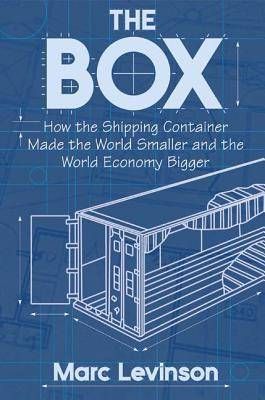THE BOX: Non-Fiction That Makes You Re-Think Your Stuff

But I’m trying to read outside my comfort zone and Stefan Stern of the Financial Times blurbed The Box as an, “Ingenious analysis of the phenomenon of containerization.”
Phenomenon of containerization? Hunh? This was the book for me! The world economy and I are worlds apart. Or so I thought.
“The box,” the ubiquitous, charmless, standardized shipping container that fits easily on ship, train or semi, makes possible the cheap flame-resistent made-in-Thailand Frozen-movie themed pajamas I just bought off the Target clearance rack because my kids, like capitalist herd animals, have moved on from Frozen to The Lego Movie to The Box Trolls.
Wow. That sounded jaded. Forgive me; I read The Box riding the Megabus from Baltimore to New York City and about the halfway point is the Port of Elizabeth, New Jersey, which was the first port in the world devoted this kind of shipping. Huge. Faceless. Vast. No more On The Waterfront longshoremen brawling dockside, lugging bananas. Ports now are largely devoid of people. (The machines are taking over!)
This seamless transportation from ship to train to truck to clearance rack is the work of one man: self-made shipping magnate Malcom Purcell McLean. “In 1956 McLean developed the metal shipping container, which…revolutionized the transport of goods and cargo worldwide.” He later founded the Sea-Land Service. Mountains of Sea-Land shipping containers were stacked in Elizabeth. Also Zim, Maersk, Mediterranean Shipping Company. These metal boxes do all our heavy lifting.
We want more and more stuff. The ships to transport all the stuff we want keep getting bigger and bigger. The Port of Elizabeth can’t handle — in fact no port in the U.S. can handle — the Triple E megaships like the Maersk McKinney Moller now plying the waters between Asia and Europe.
Because of The Box, I now think about the exact route my kid’s plastic bath toys, my dog’s treats, my husband’s undershirts, and my socks took to get to my house — by sea, rail, and road — and all of it in a corrugated steel 8 X 20 foot shipping container. It’s breathtaking global commerce, and…kinda sad. Dammit. A great nonfiction book like The Box can open up an unknown world that’s always been there; you just couldn’t see the forest for all the boxes.
____________________
Expand your literary horizons with New Books!, a weekly newsletter spotlighting 3-5 exciting new releases, hand-picked by our very own Liberty Hardy. Sign up now!


















